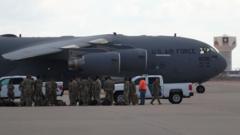Will a Judge's Ruling Save Guatemalan Children from Deportation?

Published: 2025-08-31 23:49:11 | Category: technology
In a significant legal development, a US judge has temporarily halted the Trump administration's effort to deport unaccompanied Guatemalan children back to their home country, citing concerns over potential abuse and persecution. This ruling comes in response to advocacy groups' emergency injunction, asserting that the children, currently in US custody while their immigration claims are evaluated, could face dire consequences if returned to Guatemala.
Last updated: 03 October 2023 (BST)
Key Takeaways
- A US District Court judge has issued a temporary restraining order against the deportation of Guatemalan children.
- The order affects a group of 10 children initially but has been expanded to include all unaccompanied minors at risk.
- Advocacy groups argue many children could face abuse and persecution if deported.
- The Trump administration claims the flights are for family reunifications, not deportations.
- The legal proceedings reflect ongoing tensions over immigration policy and child protection laws.
Background of the Case
The legal proceedings unfolded rapidly on Sunday, prompted by reports that approximately 600 unaccompanied children were set to be deported from Texas to Guatemala. These children arrived in the United States alone and are presently in government custody while their immigration claims are processed. Their situation has raised alarms among advocacy groups, who contend that deportation would expose them to significant risks.
The Court's Ruling
Judge Sparkle Sooknanan, who was appointed by President Joe Biden, responded to the emergency request by issuing a temporary restraining order that blocks officials from deporting the children for a period of 14 days. Initially aimed at a specific group of ten minors aged 10 to 17, the judge extended the order to encompass all unaccompanied children at risk of deportation during a hastily arranged hearing.
Arguments Presented in Court
During the hearing, Judge Sooknanan sought confirmation from lawyers representing the Trump administration that no flights had already departed with the children on board. Deputy Assistant Attorney General Drew Ensign assured the judge that all planes were currently grounded in the US, but acknowledged that one flight may have taken off but returned subsequently.
Ensign argued that the flights in question were not part of a deportation strategy but were intended for family reunifications, claiming that the Guatemalan government and relatives of the children had requested these reunifications. However, advocacy groups disputed this assertion, stating that not all families had consented to such actions.
Legal Protections for Unaccompanied Minors
The legal framework surrounding the treatment of unaccompanied minors in the US is designed to offer protection to vulnerable children. Lawyers for the children contended that the administration's actions violated federal laws aimed at safeguarding these minors. Many of the children involved had pending immigration cases and had expressed legitimate fears regarding their safety should they be returned to Guatemala.
Responses from Advocacy Groups
Efrén C Olivares, a representative from the National Immigration Law Center, described the administration's actions as reprehensible. In a statement, he remarked, "In the dead of night on a holiday weekend, the Trump administration ripped vulnerable, frightened children from their beds and attempted to return them to danger in Guatemala." The advocacy groups expressed relief that the court's intervention prevented what they viewed as an impending injustice against hundreds of children.
Political Reactions
The ruling has ignited further political debate, with White House immigration advisor Stephen Miller criticising the judge's decision. He asserted that the minors had self-reported that their parents were in Guatemala, accusing the judge of obstructing family reunification efforts. This controversy underscores the ongoing clash between immigration enforcement and child protection policies in the US.
Broader Implications for Immigration Policy
This case is part of a larger context of heightened immigration enforcement under the Trump administration, which has made significant strides in removing undocumented migrants. Since the commencement of his second term, Trump has actively pursued policies aimed at deporting individuals, a key promise that garnered widespread support during his campaign. The US Supreme Court's recent ruling in June has further enabled the administration to deport migrants to countries other than their homeland without allowing them to present their cases regarding potential risks. This legal landscape raises important questions about the balance between immigration control and the protection of vulnerable populations.
What Happens Next?
The temporary restraining order is set to last for 14 days, during which time further legal arguments and discussions will likely take place regarding the fate of these children. The court may consider additional evidence and testimonies to determine the next steps in this complex situation. As the legal landscape evolves, the experiences of these children will remain a focal point in discussions about immigration policies and child welfare in the United States.
FAQs
What is the current status of the Guatemalan children facing deportation?
A US judge has temporarily blocked the deportation of unaccompanied Guatemalan children, citing concerns over their safety and the legality of their potential return.
Why did the judge block the deportation?
The judge issued a temporary restraining order based on arguments that the children could face abuse and persecution if returned to Guatemala, violating federal protections for unaccompanied minors.
What are the arguments for family reunification?
The Trump administration claims that the flights intended for the children are part of family reunifications, supported by requests from the Guatemalan government and relatives, although this has been contested by advocacy groups.
How long will the restraining order be in effect?
The temporary restraining order will remain in place for 14 days, during which the situation will be further evaluated by the court.
What role do advocacy groups play in this case?
Advocacy groups have been instrumental in bringing attention to the situation, filing for emergency injunctions and arguing that the deportation could cause irreparable harm to vulnerable children.
The ongoing legal battles surrounding the deportation of unaccompanied minors highlight the complexities of immigration policy. As discussions continue, the welfare of these children remains a pressing concern. How can the US better balance immigration enforcement with the protection of vulnerable populations? #ImmigrationPolicy #ChildProtection #GuatemalanChildren



